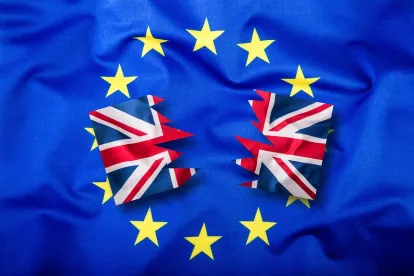On 27 February 2020, the United Kingdom (UK) government published an outline of its intended approach to the forthcoming negotiations with the European Union (EU) over the future EU/UK relationship once the Brexit transition period ends. As set out in our previous GT Alert, “UK to Formally Leave EU on Friday 31 January 2020”, while the UK formally left the EU on 31 January 2020, the terms of the UK’s departure include an 11-month transition period to allow the UK and EU to adjust to their eventual new relationship. Unless that transition period is extended by agreement with the EU, the UK’s current position – subject to EU law until 31 December 2020 and essentially a de facto member of the EU – will be replaced by a new free trade agreement in 2021, or, if agreement cannot be reached, by a future relationship on so-called ‘World Trade Organisation terms’.
The UK’s negotiating approach, The Future Relationship with the EU – The UK’s Approach to Negotiations, sets out the UK’s position across a wide range of policy areas. It contains several firm assertions as to what the UK will and will not accept in any future agreement. For example, it states that, as an overall principle and irrespective of “[w]hatever happens”, the UK will “not negotiate any arrangement in which [it] does not have control of its own laws” and will not accept any “obligations” to be aligned with EU laws or the “EU institutions, including the [European Court of Justice]”.
One of the many areas specifically discussed is environmental regulation. The UK’s negotiating approach states that the agreement governing the future UK/EU relationship “should include reciprocal commitments not to weaken or reduce the level of protection afforded by environmental laws in order to encourage trade or investment”.
It is notable that this does not provide that the UK will agree to adhere to existing EU environmental laws (which will continue to apply to the UK for the duration of the transition period), but rather that the existing “level of protection” should not be weakened or reduced. This indicates that the UK will, as expected, pursue an outcomes-focused or an equivalence-based approach to environmental regulation, but seemingly only in respect of maintaining current levels of protection and not, for example, by adopting a so-called ‘dynamic alignment’ approach where the UK would effectively match the EU’s environmental standards including how those standards change over time.
It is, however, difficult to reconcile the assertion that the UK will “maintain standards” with the overall principle that the UK will retain full “control of its own laws”. The UK’s negotiating approach provides further that while the future UK/EU agreement “should establish cooperation provisions between the parties on environmental issues”, those provisions should not be subject to the agreement’s wider dispute resolution provisions.
This has the appearance, in the round, of the UK telling the EU that, while the UK must have the freedom to enact whatever laws it wants, the EU should essentially trust that the UK will adhere to existing environmental standards, but that there will be no formal process to adjudicate disputes should the UK fail to do so. It seems unlikely, however, that the EU will accept this. Indeed, the EU’s own negotiating guidelines, published 25 February 2020, expressly provide that there should be “a level playing field so as to uphold corresponding high levels of protection over time”, i.e., that there will be restrictions on the UK’s freedom in relation to environmental protection, at least to the extent the UK wants to retain access to the EU single market.
In the Political Declaration reached between the EU and UK in October 2019 to provide a non-binding framework for the forthcoming negotiations, both parties accepted that there should be “robust commitments to ensure a level playing field” between them in respect of environmental standards. However, the Political Declaration also provides that the UK and the EU should “maintain environmental […] standards at the current high levels” and not, expressly, that the UK should be obliged to match the EU’s changing standards. Therefore, while various commentators have highlighted that the UK’s stated negotiating approach runs contrary to the Political Declaration, this may not be strictly correct – at the very least, there is ambiguity over what the UK and the EU signed up to in that document.
For its part, and while as noted above the EU’s recently released negotiating guidelines expressly provide that there should be “sufficient guarantees [in the future UK/EU agreement] for a level playing field so as to uphold corresponding high levels of protection over time”, the EU’s negotiating guidelines state that the future agreement should provide that the “common level of environmental protection […] is not reduced below the level provided by the common standards applicable within the [EU] and the [UK] at the end of the transition period” (emphasis added) across a wide range of environmental regimes. Nonetheless, the EU has indicated elsewhere that it will seek to have the right to apply tariffs on the UK if there are “disruptions of the equal condition of competition” as EU law develops and the UK fails to follow those developments as ‘reference points’ f0r its own laws.
In any event, the UK’s proposed approach is, while not unexpected, significant, since it potentially creates a situation whereby the UK could seek to diverge from future EU environmental standards as a way of obtaining a competitive advantage. As discussed in the above-referenced GT Alert, and as the EU’s desire to have a right to impose tariffs indicates, the UK’s level of access to the EU market post-transition will be conditional on the environmental standards adopted by the UK. Many of those standards go beyond regulating activities solely undertaken in the UK, and could extend to, for example, the substances allowed in products and the treatment of foodstuffs for export to the EU. The EU will be unwilling to allow its consumers to be exposed to UK products and foodstuffs where there is any risk resulting from a relaxation in UK standards vis-à-vis the EU standards applicable at any relevant time.
The UK’s negotiating approach also addresses the UK’s position in relation to specific regulatory regimes. In relation to chemicals and labelling for example, we highlighted in a 2016 GT Alert, “Brexit: The Great Repeal Bill and the EU’s Chemicals, Emissions, and Medicines Regimes”, how the UK’s withdrawal from the existing regimes as a result of Brexit could pose problems for businesses with complex cross-border supply chains. We noted, however, that one potential solution would be for the UK to continue to participate in existing pan-European regimes post-Brexit or, if the UK decided to implement its own independent regimes, “the UK could potentially seek to unilaterally accept or recognise the EU’s chemicals [regimes]”.
This appears to be the UK’s current position: the UK’s negotiating approach sets out the UK’s aim that the future UK/EU agreement could, so as to facilitate future trade in chemical substances and related products, “provide for cooperation between UK and EU authorities … and to support UK and EU businesses to meet the separate regulatory requirements of the two markets, the [UK and the EU] could agree data and information sharing mechanisms”.
It remains to be seen whether the EU will be open to this proposal, especially given the UK’s position that there should be no future role for the European Court of Justice (ECJ). It is, however, worth nothing that the EU’s negotiating guidelines potentially only envisage adjudication only by “independent and adequately resourced body or bodies” and not necessarily by the ECJ.
The focus now will be on how the UK and EU’s respective positions are reflected in the forthcoming negotiations and the extent to which the EU and UK agree or are willing to compromise on trade and co-operation terms. If compromise proves impossible, and no agreement is reached by the end of the transition period, the UK could exit the EU without any agreement on its future relationship with the EU. Further, the UK has warned the EU it will walk away from trade talks in June unless there is the ‘broad outline’ of a deal by then.
In the meantime, preparation for Brexit, as far as possible, together with monitoring negotiations remains vitally important for businesses in both the EU and the UK.
ATTACHMENTS



 />i
/>i

